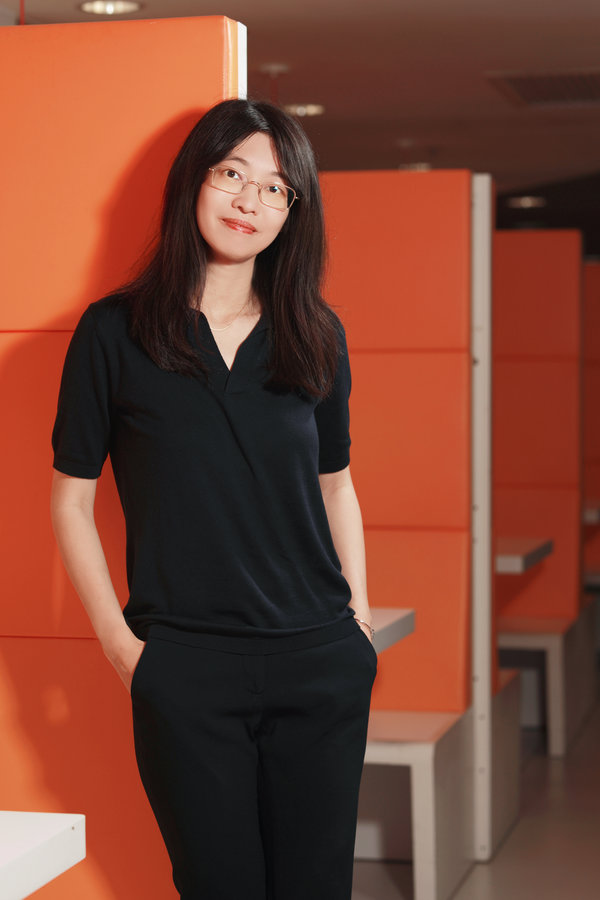Introduction to Mass Media in China
|
English News Writing & Reporting
|
Press Policy & Law of China
|
Public Relations and the Media
|
Education
|
The Chinese University of Hong Kong / Communication / Ph.D.
|
Peking University / Computer-Aided-Translation /MS.C.
|
The Chinese University of Hong Kong / Journalism / M.A.
|
Beijing Foreign Studies University/ Urdu Language and Literature / B.A.
|
Academic Publications
|
Journal Articles
|
Chen, H.-T., Luo, H., & Guo, J. (2025). The effect of exposure to political information on social media on news trust and engagement: Examining the mediating role of exposure to uncivil messages and perceived incivility. Communication and Society, 73, 41–71.
|
Wangliu, Y., Guo, J., Hu, Y., & Liu, Y. (2025). A mixed-methods study of adaption challenges and social networks of older urban relocators in China. BMC Public Health, 25, 1881. https://doi.org/10.1186/s12889-025-23095-3
|
Chen, H.-T., Song, Y., & Guo, J. (2024). When Disagreement Becomes Uncivil on Social Media: The Role of Passive Receiving and Active Expression of Incivility in Influencing Political Polarization. Communication Research, 0(0). https://doi.org/10.1177/00936502241285069
|
Guo, J., Hu, Y., & Wangliu, Y. (2024). Remote Family Communication as Discounted Compensation: Mobile Use and Psychological Well-Being Among Internal Older Migrants Within China. Social Media + Society, 10(3). https://doi.org/10.1177/20563051241274672
|
Wei, R., Lo, V. H., Guo, J. (Corresponding Author), & Yu, W. (2024). An Unhelpful Chain: Antecedents and Consequences of COVID-19 News Avoidance in China and Singapore. Journal of Broadcasting & Electronic Media, 1–20. https://doi.org/10.1080/08838151.2024.2394200
|
Wei, R., Lo, V. H., Zhang, X., Guo, J., & Yu, W. (2024). A Comparative Study of Public Support for the Zero-COVID Policy in Beijing, Taipei and Singapore: The Role of Media Attention and Perceived Social Impact. International Journal of Public Opinion Research, 36(3). https://doi.org/10.1093/ijpor/edae040
|
Guo, J., Chen, H. T., & Lu, S. (2024). Better Informed or Stay Naïve? Revisiting Different Types of Selective Exposure and the Impact on Political Learning. Journal of Broadcasting & Electronic Media, 1–22. https://doi.org/10.1080/08838151.2024.2341031
|
Guo, J., & Feng, M. (2024). Social media exposure’s effects on public support toward three-child policy in China: role of cognitive elaboration, perceived negative effects, and institutional trust. Journal of Public Policy, 44(1), 121–142. https://doi.org/10.1017/S0143814X23000326
|
Chen, H.-T & Guo, J(2023). Not bowling alone: Revisiting partisan types and participatory behaviors using the communication mediated model. Communication Research. https://doi.org/10.1177/00936502231195658
|
Guo, J. & Hu, Y. (2023). Does social media use polarize or depolarize political opinion in China? Explaining opinion polarization within an extended communication mediation model. Social Media & Society. https://doi.org/10.1177/20563051231196899
|
Guo, J., Huang, X., & Fang, K. (2023). Authoritarian environmentalism as reflected in the journalistic sourcing of climate change reporting in China. Environmental Communication, 17(5), 502-517. https://doi.org/10.1080/17524032.2023.2223774
|
Guo, J., Liu, S. (2023). From #BlackLivesMatter to #StopAsianHate: Examining network agenda setting effects of Hashtag activism on Twitter. Social Media & Society. https://doi.org/10.1177/20563051221146182
|
Jin, J., Wei, R., & Guo, J. (2023). Examining the impact of exposure to COVID-19 misinformation on vaccine hesitancy among Beijing residents. Communication and Society, 63, 239-267. https://doi.org/10.30180/CS.202301(63).0009
|
Guo, J. & Chen, H.T. (2022). How does political engagement on social media impact psychological well-being? Examining the mediating role of social capital and perceived social support. Computers in Human Behavior, 133. https://doi.org/10.1016/j.chb.2022.107248
|
Guo, J. (2022). Is computer-mediated communication more powerful than face-to-face discussion in mobilizing political participation? A study examines participation in electoral campaigns and political advocacy. Journal of Information Technology & Politics, 20(3), 235-249. https://doi.org/10.1080/19331681.2022.2084483
|
Guo, J. & Chen, H.-T. (2022). How does multi-platform social media use lead to biased news engagement? Examining the role of counter-attitudinal incidental exposure, cognitive elaboration, and network homogeneity. Social Media & Society. https://doi.org/10.1177/20563051221129140
|
Chen, H.-T., Ai, M., & Guo, J. (2022). The effect of cross-cutting exposure on attitude change: Examining the role of response behaviors, openness to diversity and social network homogeneity. Asian Journal of Communication, 32(2), 93-101. https://doi.org/10.1080/01292986.2021.2022173
|
Wei, R., Guo, J., Wang, S., & Y.-H. C. Huang (2022). The role of digital information accessibility in shaping the relationships of exposure to COVID-19 misinformation and cognitive and attitudinal effects in Asia. Communication and Society, 62, 207–264. https://doi.org/10.30180/CS.202210_62.0008
|
Guo, J. (2021). Crossing the “Great Fire Wall”: A study with grounded theory examining how China uses Twitter as a new battlefield for public diplomacy. Journal of Public Diplomacy, 1(2), 49-74. https://doi.org/10.23045/jpd.2021.1.2.049
|
Book Chapters
|
郭靖、方可成 (2024)2022年全球新聞業研究趨勢:多重危機與未來想像。張志安、徐貴權(編),《中國新聞業年度觀察報告(2022)》北京:人民日報出版社。
|
Wei, R. & Guo, J. (2023). The cognitive outcomes of misinformation: Misbeliefs and knowledge. In Wei, R., & Lo, V. et al., (2024). Miscommunicating the Covid-19 Pandemic: An Asian Perspective (pp. 130-154). London: Routledge.
|
Wei, R, Yu, Wenting, & Guo, J. (2023). Swamped: Misinformation and information overload. In Wei, R., & Lo, V-h. et al., (2023). Miscommunicating the Covid-19 Pandemic: An Asian Perspective (pp. 155-175). London: Routledge.
|
Conference Participation
|
Guo, J. (2024 July). Paradoxical Online Incivility Censorship in Authoritarian China: Conditionalized Support and Affective Paths. Paper accepted at 2024 Communication Seminar in National Chengchi University (In Taipei, Taiwan).
|
Guo, J. (2024 June). Revisiting China’s internet censorship in the “repression-dissent puzzle”: Effects of censorship experiences through negative emotions arousal. Paper accepted at 2024 Workshop on Political Psychology in East Asia (In Hong Kong).
|
Pei, X. & Guo, J. (2024, June). Aging in the era of misinformation: Towards an intersectionality approach. Paper accepted at 74th Annual Conference of International Communication Association (In Gold Coast, Australia).
|
Wei, R., Lo, V-h., Zhang, X., Guo, J., Yu, W. (2024, June). A comparative study of public support for the Zero-COVID policy in Beijing, Taipei, and Singapore: The role of media attention and perceived social impact. Paper accepted at 74th Annual Conference of International Communication Association (In Gold Coast, Australia).
|
Qu, J., Guo, J. & Zuo, Z. (2024, June). Misinformation and stigmatization: Examining how COVID-19 is stigmatized in China. Paper accepted at 74th Annual Conference of International Communication Association (In Gold Coast, Australia).
|
Guo, J. (2024, January). Political Ambivalence among Chinese youth: Psychological correlates of political ideology. Paper presented at 2024 Lisbon Winter School (In Lisbon, Portugal).
|
Guo, J. (2023, August). Hearing the other side or inside the bubble? Examining how partisan news polarize issue opinions through positive emotion and why partisanship counts for the difference. Paper presented at 2023 Annual Conference of Association for Education in Journalism and Mass Communication (In Washington D.C., USA).
|
Guo, J., Qu, J. & Zuo, Z. (2023, August). The polarized nasty talkers: Examining how different social media exposure patterns play their roles in affecting online incivility participation in China. Paper presented at 2023 Annual Conference of Association for Education in Journalism and Mass Communication (In Washington D.C., USA).
|
Guo, J. & Hu, Y. (2023, August). The interplay of news framing and comment incivility: An experimental study on the perceptual and behavioral effects of online news exposure regarding asylum seeker crime issue in Hong Kong. Paper presented at 2023 Annual Conference of Association for Education in Journalism and Mass Communication (In Washington D.C., USA).
|
Chen, H. T. & Guo, J. (2023, June). Selective approaching or avoiding: Curation in social media filter bubbles and consequences for polarization. Paper presented at 2023 Annual Conference of Chinese Communication Society (In Tainan, Taiwan).
|
Hu, Y., Guo, J., & Wangliu, Y. (2023, May). Social positioning and the construction of polymedia practices in everyday life. Paper presented at 73rd Annual Conference of International Communication Association (In Toronto, Canada and virtual). Best Student Paper Award.
|
Guo, J., Chen, H. T., Luo, H., & Lu, S. (2023, May). Consumptive news feed curation for better or worse? The effects on political knowledge and affective polarization. Paper presented at 73rd Annual Conference of International Communication Association (In Toronto, Canada and virtual).
|
Guo, J. (2022, August). Examining social media exposure’s effects on public support towards three-child policy in China: role of cognitive elaboration, perceived negative effects, and institutional trust. Paper presented at 2022 Annual Conference of Association for Education in Journalism and Mass Communication (In Detroit, USA). Top Student Paper Award.
|
Guo, J. (2021, August). Examining how digital platform diversity contributes to social media news engagement in China. Paper presented at 2021 Annual Conference of Association for Education in Journalism and Mass Communication (Virtual). Top Student Paper Award.
|
Research Grants
|
Seed Funding Support for Thesis Research 2023-24, Social Science Faculty, The Chinese University of Hong Kong.
|
Interdisciplinary Research Seed Funding 2022-23, Social Science Faculty, The Chinese University of Hong Kong. Devilish stigma and the sin of social media: examine the antecedents and consequences of Covid-19 stigmatization in China. HKD 15,000. (Principal Investigator)
|
Interdisciplinary Research Seed Funding 2021-22, Social Science Faculty, The Chinese University of Hong Kong. Polymedia communication of the elderly migrants in China and the consequences for their subjective well-being. HKD 15,000. (Principal Investigator)
|



